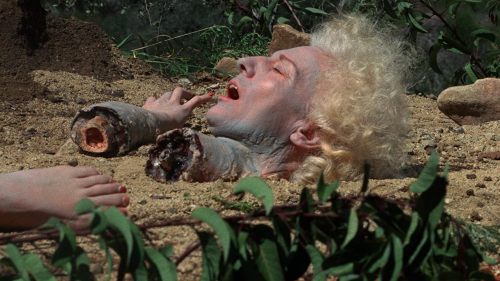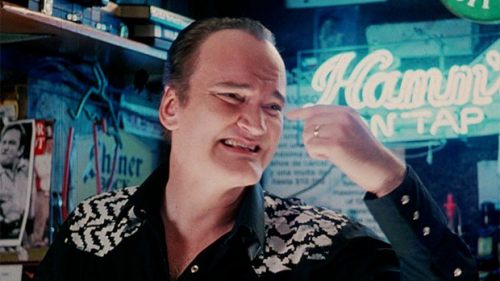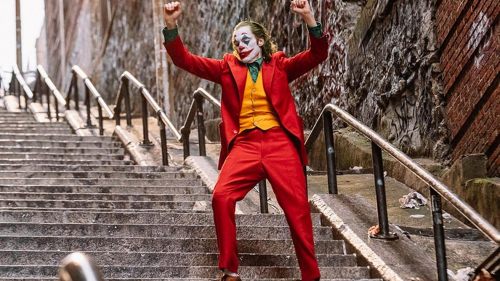ONCE UPON A TIME IN HOLLYWOOD Review: A Less Operatic But More Emotional Tarantino Entry
There are few modern filmmakers whose movies reveal themselves more gradually - and satisfy their audiences more generously - than Quentin Tarantino. The propulsive blast and feverish excitement of a first viewing shows only what happens in his stories, but it’s the second and third (and so on) that uncovers why these invigorating sequences of events occur, and most importantly, what they’re all really about. There’s a unique shift from surprise to suspense, from visceral discovery to watching the accumulation - and evolution - of dramatic weight and momentum. And the meandering, reflective Once Upon A Time In Hollywood feels like an encapsulation, and culmination, of this technique - a short fuse carefully and conspicuously laid out to explode at the absolute last minute, relieving our anticipation, rewarding our patience, and providing an emotional catharsis that reverberates long after the immediate shock of that powder keg payoff.
Set in the days and months leading up to the tragic real-life murder of Sharon Tate (played luminously here by Margot Robbie), the film follows television actor Rick Dalton (Leonardo DiCaprio), whose career hits a lull after the cancellation of his Western series Bounty Law. Languishing in villain roles on shows for rising stars like James Stacy (Timothy Olyphant), Dalton agrees to meet with producer Marvin Schwarzs (Al Pacino), who proposes he reboot his career with a series of spaghetti westerns. But alcoholism, complacency and the indefatigable patience of his stunt double, personal assistant and best friend Cliff Booth (Brad Pitt) have left him vulnerable and deeply afraid of taking a chance on roles that outwardly seem like a death sentence for his future in Hollywood.
While Dalton struggles his way through scenes from the pilot to Stacy’s new series Lancer, Booth makes home repairs and runs errands for his boss, eventually crossing paths with a young hitchhiker named Pussycat (Margaret Qualley) who asks him for a ride to George Spahn’s (Bruce Dern) ranch on the outskirts of Los Angeles, where she and a group of hippies, inspired by Charles Manson (Damon Herriman), have created a mysterious little community for themselves. But soon, Dalton and Booth’s lives become unexpectedly - and inextricably - intertwined with Sharon Tate’s when some of Manson’s followers hatch a homicidal plan at his behest, and decide to target the sleepy, isolated Cielo Road cul-de-sac where they live next door to one another.
Not since Jackie Brown has Tarantino been as unhurried in his storytelling as he is in Once Upon A Time In Hollywood, which often feels more like a kaleidoscopic travelogue into the filmmaker’s own childhood - the landscape of television shows and movies he was raised on - than a driving story about personal or professional redemption, much less a meditation on Tate and her fellow victims’ murders. His encyclopedic knowledge of not just the media of the era but the technique and even the cultural climate - where high art and populist junk collided, and were often made indistinguishable by the way they were advertised and promoted - recreates a time and a place that feels joyful to live in, even when his characters are wrestling with their fates. With such remarkable period detail adorning the locations of backgrounds of his late ‘60s setting, Tarantino never seems to tire of scenes where DiCaprio and Pitt race up and down through the Hollywood hills to songs by the Mamas and the Papas - and given how vividly he brings them to life, neither will you.
But for a filmmaker who has such an astute understanding of the narrative of other filmmakers’ careers - and a resistance to making “old man” movies - Tarantino has crafted with his ninth film (of a proposed ten) a startlingly meditative look at the challenges of remaining relevant, harnessing one’s abilities and living up to expectations, our own perhaps moreso than anyone’s, in the face of a culture that tends to remember individuals in reductive and often unfair terms. This unfolds both in the story itself and in Tarantino’s larger alternate-history mythmaking about Tate’s life and death, the details of which I won’t spoil but I believe is handled with a tenderness and generosity that should assuage at least a few concerns about the film’s potential for exploiting a brutal tragedy. And it marks a different sort of thoughtfulness for the filmmaker that unfolds in a decidedly more subtle but no less powerful way.
To that end, Pitt is sort of transcendent as Booth, the film’s quiet authority figure, repairing Dalton’s fragile ego with the same relaxed and unshowy confidence he does his boss and friend’s rooftop TV antenna. After more than 25 years as a movie star, he makes commanding the screen look absolutely effortless, and he supplies the film with a wonderful, grounding influence that makes the rest of the story feel believable no matter how wild or untethered it becomes from reality. As Dalton, meanwhile, DiCaprio exudes insecurity and vulnerability in a way we’ve seldom seen before - perhaps a testament to his own self-assurance as a performer - playing an actor who knows all too keenly he’s past his prime, succumbing to alcoholism, but still determined to deliver the goods he knows he possesses, as much for his own much-needed confidence boost as for the future of his career.
As Tate, Robbie feels like a sense memory of the real woman, lithe and stunning and effervescent as she dances (often literally) through each scene as if on a cloud of our nostalgic affection. Particularly for contemporary audiences who may not remember either her death or her promising career, Tarantino celebrates her beautifully and simply, especially in a scene where she wanders into the iconic Bruin theater in Westwood to watch her own film The Wrecking Crew as audience members giggle and cheer around her. Whether or not such a moment ever happened, it gives the real Tate a wonderful little moment of self-celebration - a connection and reminder of the people who watched and loved her - and makes her inclusion in this story a poignant and essential part of its marriage of real and imagined Hollywood legend.
Again, Tarantino’s direction here is less operatic than in the past, skillfully reflecting the kick-around, bohemian tone of the story but also the techniques of the media, and era, in which it takes place. He doesn’t quite go for full accuracy in terms of television direction - scenes unfold from multiple angles only to be interrupted by dropped lines or reset cameras - but uses the framework of his meandering story to play around in the toolboxes of the journeymen who filled his television and movie screens with entertainment as a kid.
Of course, there remains much to explore in his latest, and eventually, much more to say about these characters and their roles in what is an endlessly intriguing alternate reality. Tarantino focuses with such specificity on each character during his or her moment in the spotlight, either recreated from real life or composited out of his heroes, that the film feels like a celebration of them not only as people, or even performer and personality types, but a part of history that we wish happened. All of which makes Once Upon A Time In Hollywood certainly the best title he’s ever come with, even if it’s too soon to decide if it’s his best film, because it fits perfectly the filmmaker’s gift for keeping us engaged with his work - signaling our introduction to a story whose superficial twists and turns we will soon know, but we’re really only at the beginning of really understanding.



